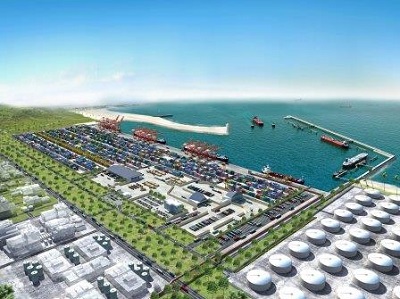Lekki Deep Sea Port: NPA Moves To Save Lagos From Imminent Disaster

· Project delivery time may be affected
The Nigerian Ports Authority (NPA) has moved to save Lagos and its residents from the imminent environmental and logistics disasters associated with the emerging Lekki Deep Seaport and Dangote Oil Refinery .
MMS Plus gathered that the authority has mandated the promoters of the Lekki Deep Seaport to incorporate rail connectivity and additional access roads to the project location to meet the basic standards of modern logistics infrastructure.
Also, the authority has written to the promoters of the multi-million dollars Dangote Refinery to incorporate pipeline as the means of evacuating their product from source, while cautioning against repeating the mistakes of Apapa port where delivery vehicles have to queue up in turns to lift products from tank farms and depots with the attendant chaos on the roads.
Confirming the intervention by NPA, the Managing Director, Ms. Hadiza Bala-Usman at media chat said she was alarmed at the discovery that the Lekki Deep Seaport has no plan for rail connectivity.
“ Before we took over two years ago,there was no provision for rail connection out of Lekki, in the Deep Sea port plan, which I found quite strange that you can have a deep sea port without the need for rail connection. It will take you two years to build the port but five years to build the rail. So, we have written the Nigerian Railway Corporation to ensure that there is a rail connection.
“ The same way we have written the Dangote Refinery to have pipeline evacuation mechanism out of Lekki, so that you don’t have trucks parking and looking for where to pick products from the refinery. There is also a proposed Lekki By-Pass in addition to the rail connectivity.
“So, one, there must be pipeline for product evacuation; two, there must be rail connection, three, there must be additional means of road transportation and access. So, we need to work to have some sanity in five years time. If we do not deploy what is required now, in five to ten years time, Lekki will be unmanageable. I am a believer of starting something, even if you do not finish it, start it.” She added.
The promoters of the project, Tolaram group, are targeting about 1.5 million 20ft equivalent units container capacity annually, which is expected to grow to about 2.7million and 4.7million TEUs, when the operations commences..
The project is being primed to be one of the largest deep water ports in the sub-Sahara Africa and also serve as the hub of ports operations in the whole of West Africa with the potentials to l possibly be the largest in Africa capable of influencing the generation of about 170,000 direct and indirect jobs in the nation.
.
The Minister for Transportation, Rt. Hon Rotimi Amaechi while applauding the project at a recent function noted that what Nigeria currently has are the river ports, in Tin-Can Island, Apapa, Port Harcourt, Onne and others with limited capacities, pointing out that any country that desires to have a fair global maritime market share must consider a deep seaport in its domain. He expressed optimism that the project would help to generate outward and inward cargoes, improve the capacities of our ports for space utilization, will be able to accommodate Panamax and post panamax cargoes, very large crude carriers, ultra large crude carriers and other categories of large vessels.
He said “This will be the first deep seaport in Nigeria and I wish to congratulate Tolaram Group and the Nigeria Ports Authority (NPA). With the deep seaport, modern cargo handling methods and new operating procedures would be created to enable the transfer of skills and technology. The port is expected to be executed through a special purpose vehicle (SPV) Lekki Port, Free Trade Zone enterprise initiative on a non-recourse financing basis.”
Amaechi said the equity participation in the budget is expected to be at the ratio of 75%, 05% to 20% and that the authorities had also granted a concession of the port for 45 years on a Build, Own, Operate and Transfer (BOOT) model even as he assured that the Federal Ministry of Transportation is determined to continue to support projects aimed at improving the quality of infrastructures, ports development and the maritime sector as a whole.
“It is important for Tolaram Group to know that at anytime NPA is able to raise money they will buy and get back their 15%, that was the agreement we had, in favour of the private investor, the federal government itself, NPA and Lagos state government. We will ensure the adherence of NPA to the Data and for the concession and other agreements with respect to this project.” He added.
NPA has a fully paid the share capital of 5% which is the minimum investment enough to give the private investor confidence and without having any fear of undue interference by the regulator. The other 95% is owned by 18 to 8 sharing ratio by the Lagos state government and the private investors respectively and the 75% share holding owned by Tolaram group where the federal government of Nigeria holds an additional 15% shareholding which is to the value of $107 million.
Meanwhile, the Dangote Oil Refinery is an integrated refinery and petrochemical complex in the Lekki Free Zone with an estimated cost of $9 billion. The project is expected to generate 9,500 direct and 25,000 indirect jobs.
Nigeria is estimated to hold approximately 37 billion barrels of proven oil reserves, which is the second biggest in Africa. The country, however, imports majority of its refined products due to lack of domestic refining capacity.
The new refinery will double Nigeria’s refining capacity and help in meeting the increasing demand for fuels, while providing cost savings.
The refinery site covers an area of 2,635ha on the Lekki Free Zone near the Lekki Lagoon. The location will enable easy transshipment of refined petroleum products to the international markets.







